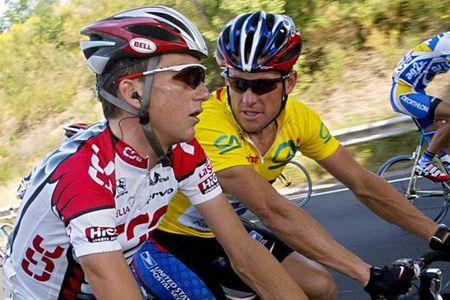 Coincidentally, the reports that Lance Armstrong is
mulling a confession for a career-long and systematic doping regimen that
helped him win the Tour de France seven times as well as an Olympic medal and
plenty of other races, comes just as I finished reading teammate Tyler
Hamilton’s book chronicling those years.
Coincidentally, the reports that Lance Armstrong is
mulling a confession for a career-long and systematic doping regimen that
helped him win the Tour de France seven times as well as an Olympic medal and
plenty of other races, comes just as I finished reading teammate Tyler
Hamilton’s book chronicling those years.
Obviously, Armstrong’s admission is too little, too late. But, with anything involving Armstrong one has to look for a Machiavellian plan at work. What is the endgame for a guy who spent two decades attempting to destroy any one who told the truth? It can’t be that he simply wants to race triathlons or marathons again, could it? He can do that any time or anywhere.
Does he really need attention that badly?
An admission is a bit surprising because there are so many obstacles for Armstrong to leap over. For instance, if he admits to doping all those years, he’s wide open to an array of lawsuits. Over the years Armstrong successfully sued or received settlements from entities that claimed he doped. If it comes out that he actually did everything as reported by the likes of Hamilton and Floyd Landis, there’s going to be a long line of folks trying to get some money.
Armstrong also would be open to federal perjury charges in Landis’ whistle-blower suit against the US Postal racing team. In other words, in order to admit to doping, Armstrong would have to be reassured that he would not lose all of his money nor spend time in jail.
Bigger than everything is the fact that with an admission, Armstrong would have to apologize to A LOT of people. He destroyed careers, ruined businesses and shattered credibility. In every personal relationship, Armstrong was a nuclear bomb—he was a friend for a minute and then devastating the next.
Lance Armstrong is the Bernie Madoff of sports.
Nevertheless, the book Hamilton wrote with Daniel Coyle is fascinating. Most amazing is how much time, energy and money pro riders put into doping. Considering the best riders were paid a salary similar to a veteran situational lefty in the major leagues, it seems as if the primary goal of many was to do drugs.
Here are the biggest takeaways from the book:
- Armstrong wasn’t good enough
Oh sure, he won the Tour de France seven straight years in an era in which most riders were doing all the same things. But how many would he have won if he and all the other riders were clean? What if Jan Ullrich wasn’t suspended for a non-performance enhancing drug like ecstasy?
This isn’t suggesting that Armstrong wasn’t a good bike racer. However, I don’t know if he was as talented as Ullrich or Bjarne Riis or Ivan Basso or Iban Mayo or Alexander Vinokourov or any number of the top riders of his day.
In other words, the drugs worked.
- Everyone who left Lance got popped
Yep, every time a top lieutenant left Armstrong to be The Man on another team, they somehow tested positive. Moreover, they tested positive under extraordinary circumstances. Obviously there was Hamilton and Landis as the biggest names, but what about Roberto Heras? Or, how was it that the biggest threats to Armstrong’s supremacy all met the same fate yet he always seemed to be one step ahead?
Mayo, Basso, Riis, Vinokourov, Ullrich, Hamilton, Landis, etc., etc., etc., all got nailed. Every single one of them.
Everyone got it except for one guy ...
Curious.
- My hematocrit must be too low
I’m running 10 miles a day and I’m tired … where’s the Aleve or Ibuprofen? Anyone see my rest-day blood?
Back to Lance …
More than five years ago, I spoke with Landis about Armstrong and possible secrets he might be hiding. At first the question was couched that perhaps Armstrong, one of the most famous athletes in the world, had a secret tattoo or webbed feet or something relatively benign. Instead, the response from Landis seemed to indicate that Armstrong was a jerk. Re-reading the question and answer after so many have come forward about Armstrong’s alleged doping is fascinating.
“I don’t think I know anything that anyone else knows. People have perceptions of him that might not be very accurate, but I don’t know any details that they wouldn’t know. The guy is obsessed. With whatever he does he is obsessed, and whatever he does he wants to be the best at it.
“Ultimately, he doesn’t have a lot of close friends because of it and he winds up not being the nicest guy. But that doesn’t make him a doper. That doesn’t make him a cheater. It might make him someone you don’t want to be around, but that doesn’t mean he took advantage of anyone else or that he deserves the harassment some people are giving him, like in the Walsh book.”
Not even three years later Landis said that in addition to not being a nice person, Armstrong was indeed a doper and a cheater… just like all the rest of them.
